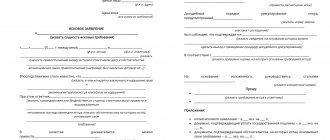Rules for filing a claim
The claim of the heirs must be sent to the district level authority. The case is considered at the place of residence of the legal successor. Before submitting an application, you need to conduct an examination of the value of the property.
This is necessary in order to set the claim price . To do this, contact the bodies conducting cadastral registration, or an independent organization engaged in valuation activities.
Regardless of which assessment method is used when drawing up an application to the court to establish inheritance rights, the citizen will need to pay for these services. When all the documents have been collected, you can file a claim for acceptance of the inheritance.
Important! It is required to prepare as many copies of statements as there are persons who will participate in the case.
Payment of application fee
Inheritance lawsuits require mandatory payment of state fees. The price varies constantly. The reason is that it depends on the value of the property transferred by will or by law.
In some situations, a citizen may be exempt from making payments. However, this possibility will need to be documented.
Indicators taken into account:
- material support of the person;
- solvency.
For example, if a claim for inherited property is filed by a disabled person who was fully supported by the deceased, the judge may decide not to pay the fee.
Document submission deadlines
According to the provisions of the Civil Code of the Russian Federation, after a citizen dies, his successors must apply to a notary within six months.
If the specified period is missed by a person, it is necessary to file a claim in court. However, the reasons for missing such a deadline must be valid . For example, this is being in long-term hospital treatment. This fact is documented.
The claim to identify an heir is submitted within six months. The countdown begins from the moment when the reasons influencing the impossibility of acquiring rights no longer exist.
Statement of claim for recognition as having accepted an inheritance sample and drafting example
In the __________________________ city court of the ________________________________ region Address: __________________________________ Plaintiff: __________________________________ Address: __________________________________ Interested parties: __________________ ________________________________________ ________________________________________ Price of the claim: ______________________________
STATEMENT OF CLAIM for the actual acceptance of the inheritance and recognition of the ownership right to the actually accepted inheritance
“___” died on _____________ year _______________________ (full name of the testator). Due to the fact that the deceased had no close relatives, and I, in turn, being his neighbor in the countryside, provided the deceased with the maximum possible moral and material assistance for me during his lifetime, they decided that he would bequeath everything, the property he has to me, ___________________________.
“___” __________ year _________________ (full name of the testator) contacted the notary of the _________ notarial district of the _________ region of ______________, whose will was drawn up and signed. In accordance with the said will, _____________________ (full name of the testator) bequeaths to me, ________________________ all his property, which by the day of death turns out to belong to him, whatever it may be and wherever it is located.
After the death of ___________, inherited property remained, namely, a plot of land with a house located at the address: __________________________________________. The total area of the land plot is ____ sq. m., cadastral number _____________. I took upon myself all expenses associated with the burial of _____________________ (full name of the testator).
I, as a person who does not have a legal education, was not aware of the time frame within which it is necessary to contact a notary to open an inheritance case and enter into inheritance rights. All I knew was that until the expiration of 6 months from the death of the testator, I cannot dispose of the property bequeathed to me. Due to legal illiteracy, this fact was interpreted by me, as it turned out later, incorrectly. I mistakenly believed that I should contact a notary immediately after the expiration of the 6 month period. When I turned to the notary with an application for issuing a certificate of inheritance rights, I was informed that I had missed the deadline provided for by the legislation of the Russian Federation for entering into inheritance rights.
Despite the fact that I did not contact the notary within the period established by law, I took actions indicating the actual acceptance of the inheritance after the death of _____________________ (full name of the testator).
So, my family members and I take care of the land plot and the house located on it that belonged to the deceased, which is confirmed by the photographs offered with the statement of claim. We pay electricity bills (copies of payment documents are attached). In accordance with paragraph 2 of Art. 1153 of the Civil Code of the Russian Federation: “It is recognized, until otherwise proven, that the heir accepted the inheritance if he performed actions indicating the actual acceptance of the inheritance, in particular if the heir:
- took possession or management of inherited property;
- took measures to preserve the inherited property, protect it from encroachments or claims of third parties;
- made at his own expense expenses for the maintenance of the inherited property;
- paid at his own expense the debts of the testator or received funds due to the testator from third parties.
According to paragraph 2 of Art. 1152 of the Civil Code of the Russian Federation: when an heir is called to inherit simultaneously on several grounds (by will and by law or by way of hereditary transmission and as a result of the opening of an inheritance, etc.), the heir can accept the inheritance due to him on one of these grounds, on several of them or for all reasons. Based on Art. 264 of the Code of Civil Procedure of the Russian Federation, the court can establish the fact of acceptance of the inheritance.
In accordance with Art. 218 of the Civil Code of the Russian Federation, in the event of the death of a citizen, the right of ownership of the property belonging to him passes by inheritance to other persons in accordance with a will or law.
Based on the above, guided by Art. 218, 1152, 1153 Civil Code of the Russian Federation and Art. 264 Code of Civil Procedure of the Russian Federation:
Ask:
1. Recognize me, ________________________, as having actually accepted the inheritance after the death of ____________________ (full name of the testator); 2. Recognize my ownership of the inherited property, namely a plot of land with a house located at the address: __________________________________________. The total area of the land plot is ____ sq. m., cadastral number _________.
Applications:
1. Copies of the statement of claim by number of parties. 2. A copy of the will. 3. A copy of the death certificate. 4. A copy of the certificate of state registration of the right. 5. A copy of the receipt for payment of electricity. 6. A copy of the payment order for electricity payment. 7. Photos of the land and the house. 8. Receipt for payment of state duty. 9. Copy of the power of attorney.
"______"___________________G.
_________________________
In what cases is it necessary to recognize rights to the hereditary mass?
An application for inheritance and recognition of property rights is submitted in certain cases.
These include:
- refusal of an employee of a notary office to formalize rights to property transferred within the framework of inheritance legal relations;
- the appeal occurred after 6 months from the date of death of the person;
- recognition of the testamentary act as invalid;
- the presence of errors in the documentation indicating the receipt of inheritance;
- the need to recognize rights to property for citizens who are minors or who have lost their legal capacity.
If the current situation is included in the specified list, you will be able to file a claim.
Grounds for going to court
The basis for filing a claim in court may be a refusal to issue a document confirming a person’s rights to inheritance.
Most often, an authorized person refuses to issue this document on the following grounds:
- missing procedural deadlines;
- lack of certificates and certificates confirming the existence of a blood relationship between the testator and the applicant;
- the testator lacks rights to dispose of property. Most often, this situation occurs among people living in villages. Since people do not re-register ownership, the property simply actually passes to the heirs. Also, a similar situation may arise if the testator did not have time to complete the construction of the property and did not draw up documents for it;
- the emergence of disputes between heirs.
Any of these grounds leads to the fact that the heir cannot obtain a title document for the disputed property and register the property.
If the reason for refusal was the lack of necessary documents or rights, then you need to apply to a judicial authority with a claim to establish a legal fact. If this inheritance case is being heard in court, then there is no point in filing a claim in court.
Rules for filing a claim
When applying to a court to resolve the issue under consideration, special attention must be paid to drafting the claim. If a document is drawn up in violation of the rules, the judge will refuse to accept it.
Therefore, a sample is required.
The required elements of the application are:
- an indication of the property that is subject to inheritance;
- price of the entire mass;
- location of other legal successors, if any;
- grounds of inheritance;
- information about the existence of family ties between the applicant and the deceased;
- date of preparation and signature of the parties.
The more detailed a citizen describes the situation, the fewer questions the court will have. The application is accompanied by documents confirming the position of the applicant.
Who files the claim?
Inheritance claims of this category are directed by legal successors under a testamentary act or by force of law. These citizens will need to prove that they accepted the right of inheritance in fact.
For this you can use:
- a receipt confirming payment of the duty;
- receipts indicating the purchase of materials and repair work;
- a certificate obtained as a result of paying off a debt for the deceased.
Sometimes only sub-designated legal successors can submit an application to determine the circle of heirs. This occurs if the main heirs have lost the right to claim the estate of the deceased.
Sample
A sample statement of claim for acceptance of inheritance helps a person create a document taking into account all the rules.
It looks like this:
Statement of claim to the court for recognition of the right to inheritance
Thus, when filing a claim for recognition of rights to inherited property, it is necessary to take into account the provisions of the Civil Code of the Russian Federation. If a mistake is made when preparing the application, the court will refuse to accept it or will give time to finalize the document. This will affect the increase in the period for consideration of the case.
In what cases does a notary refuse to register property rights?
The reasons why a notary refuses to recognize an inheritance for a certain successor may be the following:
- the heir misses the deadline established by law for accepting the inheritance;
- illiteracy or lack of necessary documents (failure to submit them);
- non-obviousness of the rights of the successor;
- others.
If the notary refuses to formalize the rights to the inheritance, this can be done in court. However, in court you will also have to prove your rights to the property of a deceased relative.
Defendants in the case
In cases of recognition of the right to inheritance, the following may be involved as defendants:
- individuals who have the right to inheritance. This may include heirs by law and by will, as well as other persons who have the right to a share of the inheritance;
- legal entities;
- competent persons (local government bodies, housing and communal services workers, notary, etc.), if the property was transferred to the category of escheat, if the property was transferred to third parties, if the notary refused to perform legally significant actions, etc.
Watch the video. Recognition of rights by inheritance:
What does actual acceptance of an inheritance mean?
The term for the actual acceptance of the inheritance mass is disclosed in the Resolution of the Supreme Court of the Russian Federation dated April 23, 1991 No. 2.
Based on this document, the actions of a person recognized as an heir, aimed at taking possession, protecting, and using the property remaining after the death of the person, constitute the actual acceptance of the inheritance mass.
The implementation of these actions can be confirmed by the payment of utility bills, the transfer of premises for rent, the return of the original appearance, and so on.
These actions must be completed no later than 6 months from the date of death of the testator.







